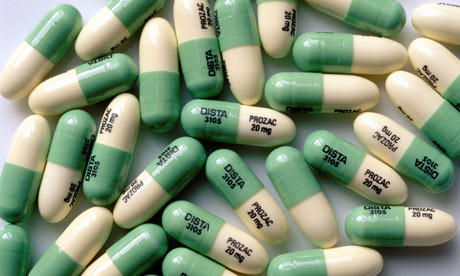Researchers say morality treatments could be used instead of prison and might even help humanity tackle global issues - Progress, Big Brother or just creepy…?

Existing drugs such as Prozac are already known to affect moral behaviour, but scientists predict that advances may allow more sophisticated manipulations. Photograph: Scott Camazine/Alamy
A pill to enhance moral behaviour, a treatment for racist thoughts, a therapy to increase your empathy for people in other countries - these may sound like the stuff of science fiction but with medicine getting closer to altering our moral state, society should be preparing for the consequences, according to a book that reviews scientific developments in the field.
Drugs such as Prozac that alter a patient's mental state already have an impact on moral behaviour, but scientists predict that future medical advances may allow much more sophisticated manipulations.
The field is in its infancy, but "it's very far from being science fiction", said Dr Guy Kahane, deputy director of the Oxford Centre for Neuroethics and a Wellcome Trust biomedical ethics award winner.
"Science has ignored the question of moral improvement so far, but it is now becoming a big debate," he said. "There is already a growing body of research you can describe in these terms. Studies show that certain drugs affect the ways people respond to moral dilemmas by increasing their sense of empathy, group affiliation and by reducing aggression."
Researchers have become very interested in developing biomedical technologies capable of intervening in the biological processes that affect moral behaviour and moral thinking, according to Dr Tom Douglas, a Wellcome Trust research fellow at Oxford University's Uehiro Centre. "It is a very hot area of scientific study right now."
He is co-author of Enhancing Human Capacities, published on Monday, which includes a chapter on moral enhancement.
Drugs that affect our moral thinking and behaviour already exist, but we tend not to think of them in that way. [Prozac] lowers aggression and bitterness against environment and so could be said to make people more agreeable. Or Oxytocin, the so-called love hormone ... increases feelings of social bonding and empathy while reducing anxiety," he said.
"Scientists will develop more of these drugs and create new ways of taking drugs we already know about. We can already, for example, take prescribed doses of Oxytocin as a nasal spray," he said.
But would pharmacologically-induced altruism, for example, amount to genuine moral behaviour? Guy Kahane, deputy director of the Oxford Centre for Neuroethics and a Wellcome Trust biomedical ethics award winner, said: "We can change people's emotional responses but quite whether that improves their moral behaviour is not something science can answer."
He also admitted that it was unlikely people would "rush to take a pill that would make them morally better.
"Becoming more trusting, nicer, less aggressive and less violent can make you more vulnerable to exploitation," he said. "On the other hand, it could improve your relationships or help your career."
Kahane does not advocate putting morality drugs in the water supply, but he suggests that if administered widely they might help humanity to tackle global issues.
"Relating to the plight of people on other side of the world or of future generations is not in our nature," he said. "This new body of drugs could make possible feelings of global affiliation and of abstract empathy for future generations."
Ruud ter Meulen, chair in ethics in medicine and director of the centre for ethics in medicine at the University of Bristol, warned that while some drugs can improve moral behaviour, other drugs - and sometimes the same ones - can have the opposite effect.
"While Oxytocin makes you more likely to trust and co-operate with others in your social group, it reduces empathy for those outside the group," Meulen said.
The use of deep brain stimulation, used to help those with Parkinson's disease, has had unintended consequences, leading to cases where patients begin stealing from shops and even becoming sexually aggressive, he added.
"Basic moral behaviour is to be helpful to others, feel responsible to others, have a sense of solidarity and sense of justice," he said. "I'm not sure that drugs can ever achieve this. But there's no question that they can make us more likeable, more social, less aggressive, more open attitude to other people," he said.
Meulen also suggested that moral-enhancement drugs might be used in the criminal justice system. "These drugs will be more effective in prevention and cure than prison," he said.
By Amelia Hill - guardian.co.uk, Monday 4 April 2011 16.23 BST